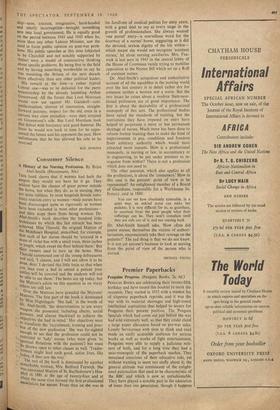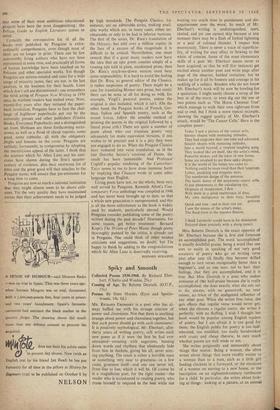Premier Paperbacks
Penguins Progress. (Penguin Books, 2s. 6d.) PENGUIN BOOKS are celebrating their twenty-fifth birthday and have issued this booklet to mark the occasion. They started in 1935 with a modest list of sixpenny paperback reprints, and it was the war with its material shortages and high-toned intellectual aspirations that helped to secure for Penguins their present position. The Penguin Specials which had come out just before the war had sold extremely well, so that they could claini a large paper allocation based on pre-war sales. Lonely Servicemen with time to think and read made an easily accessible audience for serious books as well as works of light entertainment. Penguins were able to supply a judicious mix- ture of both, and for a long time they had a near-monopoly of the paperback market. They remained conscious of their educative role, yet without wanting to seem too stuffy about it; the general attitude was reminiscent of the enlight- ened paternalism that used to be characteristic of the BBC and which is now so unfashionable. They have played a notable part in the education of more than one generation, though it happens
that some of their most ambitious educational projects have been the most disappointing: the Pelican Guide to English Literature comes to mind.
Certainly the retrospective list of all the books ever published by Penguins is extra- ordinarily comprehensive, even though most of them are no longer in print. There can be few noteworthy living authors who have not been represented at some time, and practically all forms of human knowledge have been touched on by Pelicans and other specialist works. Yet though Penguins are serious-minded and cater for a wide range of minority tastes, they are not, in the last analysis, in the business for their health. Lines which don't sell are discontinued : one remembers the brisk axing of Penguin New Writing in 1950 once its wartime readers had melted away. Now, twenty-five years after they initiated the paper- back revolution, Penguins have to face the chal- lenge of highbrow paperbacks put out by the university presses and other publishers (Unwin Books, Everyman Paperbacks and a distinguished set from Methuen are three forthcoming acces- sions), as well as a flood of cheap reprints, some . good, some rubbishy, all with the obligatory _thighs and bosoms on the cover. Penguins are unlikely, fortunately, to compromise by adopting the meretricious appeal of the latter. I think that the acumen which Sir Allen Lane and his asso- ciates have shown during the firm's quarter- century of existence, plus their enormous list of titles and the great good will that attaches to the Penguin name, will ensure that pre-eminence for a long time to come.
Penguins are now so much a national institution that they might almost seem to be above criti- cism. Yet the very quality they have maintained means that their achievement needs to be judged
by high standards. The Penguin Classics, for instance, are an admirable. series, making avail- able works which are, in many cases, either un- obtainable or only to be had in inferior versions. The first of the series, Dr. Rieu's translation of the Odyssey, has sold over a million copies; in the face of a success of this magnitude it is difficult to be critical. Nevertheless, one must remark that if a great many readers now have the idea that an epic poem consists simply of a rousing tale told in plain, unadorned prose, then Dr. Rieu's reach-me-down version must bear some responsibility. It is hard to avoid the feeling that Dr. Rieu, as general editor of the Classics, is rather suspicious of poetry. There might be a case for translating Homer into prose, but surely there can be none at all for doing so with, for example, Virgil's pastoral poems, unless the original is also included, which it isn't. (On the other hand, the Penguin books of French, Ger- man, Italian and Spanish poetry, such as the recent Lorca, follow the sensible method of printing the poems in the original followed by a literal prose crib.) There are quite a number of poets about who can translate poetry very adequately (or make equivalent versions, if one wishes to be precise) and it is a pity they were not engaged to do so. When the Penguin Classics have ventured into verse translation, as in the late Dorothy Sayers's versions of Dante, the result has been lamentable. And Professor Coghill's popular rendering of the Canterbury Tales seems to me to have done immense harm by implying that Chaucer wrote in some other language than English.
Living poets have not, on the whole, been very well served by Penguins. Kenneth Allott's Con- temporary Verse anthology was compiled in 1948 and has never been brought up to date, so that a whole new generation is unrepresented, and this is all the more unfortunate as the book is widely used by students, particularly abroad. Would Penguins consider publishing some of the poetry written during the past decade? Dramatists, for some reason, get better treatment: Bernard Kops's The Dream of Peter Mann, though pretty thoroughly panned by the critics, is already out in Penguins. One could think of other modest criticisms and suggestions, no doubt, but I'm happy to finish by adding to the congratulations which Sir Allen Lane is deservedly receiving.
BERNARD BERGONZI











































 Previous page
Previous page